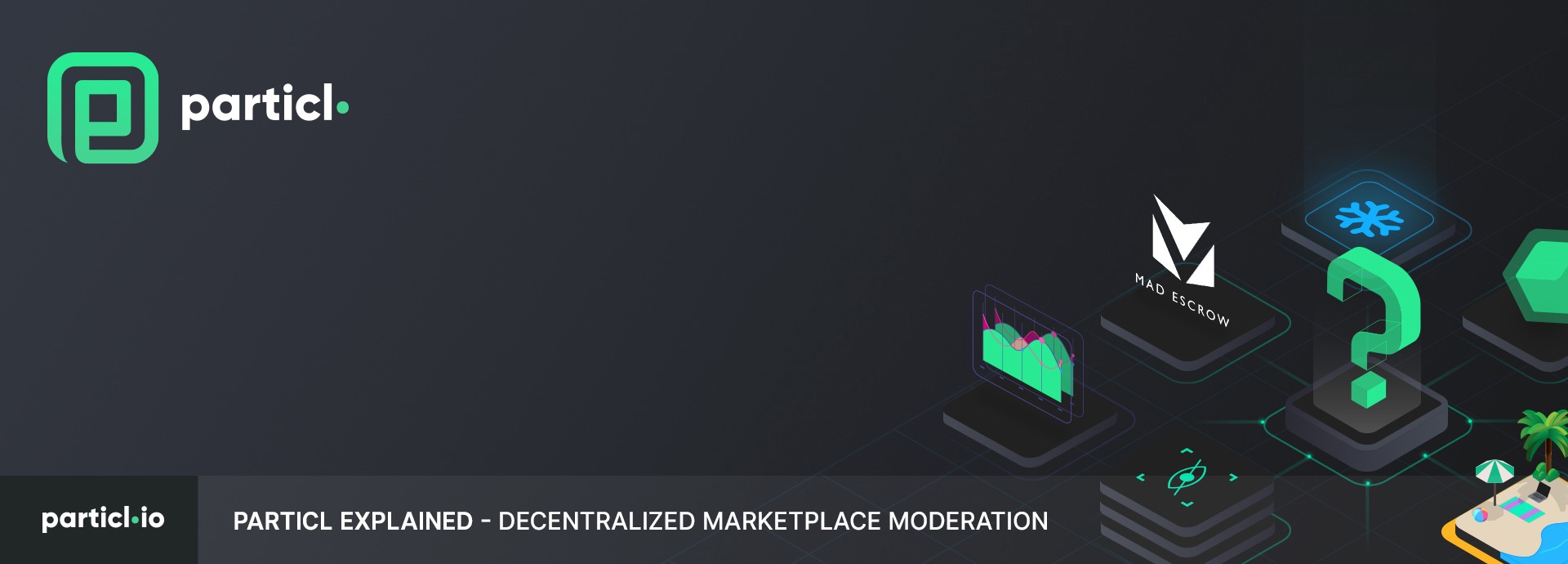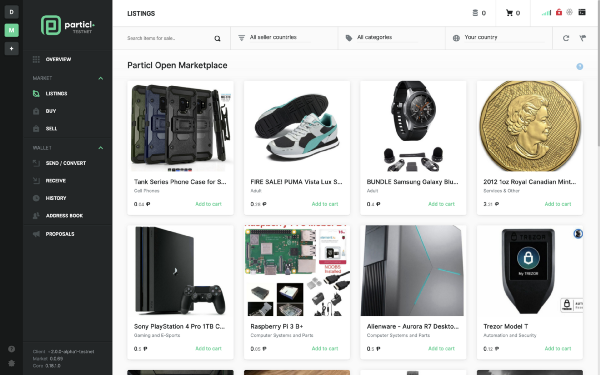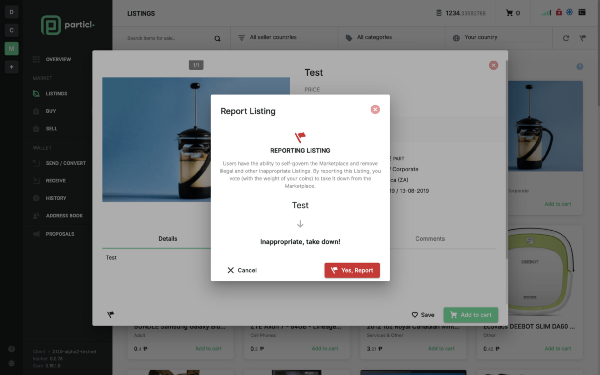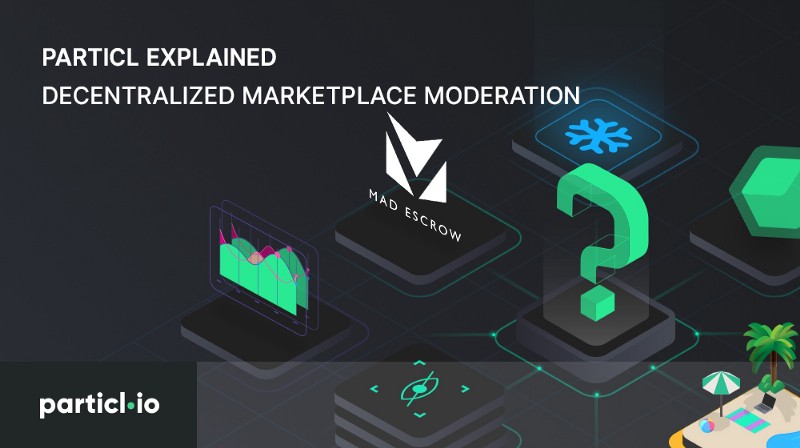
Particl is an entirely decentralized platform. There is no third-party or intermediary operating it and having any sort of control over its network. It uses a mix of P2P and blockchain technologies, meaning that it is exclusively run by its global community of users.

The Open Marketplace is an equally decentralized application that’s built on top of the Particl network. It allows anyone in the world to buy and sell goods and services, physical or digital, regardless of where they are located in the world. And because it is entirely decentralized, there’s no staff or support team to enforce rules and policies.
Furthermore, the Open Marketplace is completely private by default, meaning no identifiable data can be linked to any of its users. Transactions are hidden on the blockchain, images are stripped of their metadata, data exchange is encrypted, and you can even connect the marketplace through the Tor network. In other words, users of the marketplace are anonymous.
Undesirable Content
This, however, introduces a bit of an issue when it comes to the content being put on there. After all, how can you prevent anyone from buying or selling anything when there are no rules and no central party with special permissions to moderate it? Giving special permissions/powers and allowing certain users to delete content and hold such a strong position of power is a slippery slope and, on a long enough timeline, ultimately a slow crawl back to the old ways where a company would run its own platform, impose its rules, and charge fees.
But this isn’t what Particl is about. No, Particl is about full decentralization and complete privacy. The recent years, with all of the data breaches like Equifax’s and the abuse of data like with the constant scandals involving Facebook, have shown without a doubt that the tech industry needs to evolve and start protecting its users. And, because data has become so valuable and such a big target for hackers, we cannot expect or trust centralized models such as Amazon, Alibaba, eBay, and central parties, to effectively secure our data.
This is why Particl’s Open Marketplace is entirely decentralized and private-by-default. Its “trustless” nature, meaning that you do not need to trust any entity to behave honestly, ensures that none of your data can be collected by any party other than the ones you transact with. It is, simply put, the next logical step in the evolution of eCommerce technology. But like any new groundbreaking technology, it also introduces new challenges. Keeping the marketplace free from undesirable listings is one of them.
Decentralized Governance
To fight off undesirable content, Particl has put in place a completely decentralized and provably fair governance mechanism where anyone can vote off undesirable listings.
Quick Facts:
- Voting power ratio: 1 PART coin = 1 vote
- Delisting threshold at time of publishing: -9,000 PART (adjustable)
- Need to be staking?: No
- Fee for flagging an item: Less than 0.001 PART for the first person to flag, free for additional flaggers
Delisting Threshold
To vote against a specific listing, users need to flag it using the Open Marketplace user interface. Once the first user marks a listing as undesirable, it gets taken into a queue of previously flagged listings where other users will be able to either agree that it should be taken off the marketplace, or disagree and vote for it to remain listed. For a listing to be completely delisted, its score needs to reach a certain negative threshold.
Particl’s decentralized moderation system can be compared to the Reddit upvote/downvote system. On Reddit, if 5 users downvote a post, and 3 users upvote it, the post has a score of -2. Usually, when it reaches a certain negative threshold (i.e. -10), the post is automatically hidden from other users. Reddit counts votes on a 1 user = 1 vote basis.

Particl’s listing moderation system is similar. Each user that flags and votes for a listing contributes to either increasing or decreasing the listing’s score. It also deletes the listing from the user’s personal instance of the client (deleted locally, but not hidden globally until the listing reaches the delisting threshold). But because Particl is private by design and entirely decentralized, there is no real way for the platform to detect a user that created multiple addresses or used virtual machines to game the system and register fraudulent votes. The network cannot ban an account, blacklist an IP address, or manually adjust votes to try to fight off spam votes.
Instead, Particl counts votes on a 1 coin = 1 vote, which makes it impossible to game the system. If you want to add more power to your votes, you can do it in a legitimate way: acquire more PART coins. No matter how many wallets you use, or no matter how many times you try changing your IP address, the system only takes the “coin weight” into consideration when counting votes. This ensures only those with a stake in the network can influence governance outcomes.
The delisting threshold of the Particl Open Marketplace will be -9,000 during the first mainnet version. That threshold can and will be adjusted on the way forward. It may take a few tweaks until the perfect ratio is reached, but because game-theory is impossible to test on testnet (because test coins don’t hold any value), it has to be tested out in the wild.
Game-Theory
As you probably now realize, this mechanism is actually pretty simple, but it’s also quite strong and effective. The reason behind this is the whole game-theory aspect of it.
To have significant voting power and single-handedly influence votes, a user needs to acquire a lot of coins. This can be quite expensive depending on the active delisting threshold ratio (in the first mainnet version of the marketplace, that threshold will be -9,000), and it only gets more expensive as the platform starts getting more network effect.
And because voters have a direct financial stake in the network, they are directly incentivized to behave correctly. If voters colluded with each other and started trolling or censoring the marketplace, that would arguably reduce the value of the network and incur a net loss for all co-conspirators.
Additionally, if users do not pro-actively keep the public interface of the marketplace clean, it might result in a platform filled with undesirable or spammy content, which would contribute to driving people away. That, too, would severely reduce the potential network effect and would be a serious obstacle to Particl reaching a more mainstream audience.
Since voters are users with a financial stake in the network, driving users away from the platform is not something being desired. That is especially true of a marketplace — more users mean more products to buy (for buyers) and more potential customers to reach (for vendors). That is why keeping the interface clean is a small, but not insignificant, contribution each user can make to the network.
FAQ
- What’s the delisting threshold?
- The delisting threshold is currently at -9,000 for the first mainnet version of the Open Marketplace. This threshold can and will be adjusted moving forward.
—
- Will listings disappear after I vote them off?
- When you flag a listing, it is deleted locally, meaning that it is taken off your own personal instance of the marketplace, but not for other users. A listing is only delisted from everyone’s marketplace instance once it reaches the delisting threshold.
—
- Do I need to be staking to vote?
- No, coins do not need to be staking. Anyone with a coin can vote.
—
- Can I vote if my coins are stored on a hardware device?
- Not initially, but hardware device support is something being considered for later in the future.
—
- Is there a fee for flagging listings?
- If you are the first user to flag a listing that has never been flagged before, you will need to be a sub-cent fee (0.00x PART or less). If you are flagging a listing that’s already been flagged before, then there is no fee to be paid.

Particl is Participation
Get recognized as someone that cares. With your help, we become more noticed out there. It takes seconds, and you are making a statement by giving us a follow and hitting the bell icon.
YouTube Twitter Mastodon Reddit
Join the instant messaging chats. There's no need to be active, but it’s good to be in the loop.
Discord Telegram Element / Matrix
Gain deep knowledge about Particl by reading.
Last but not least, a list that shows an infinite number of links clearly categorized and on one page.